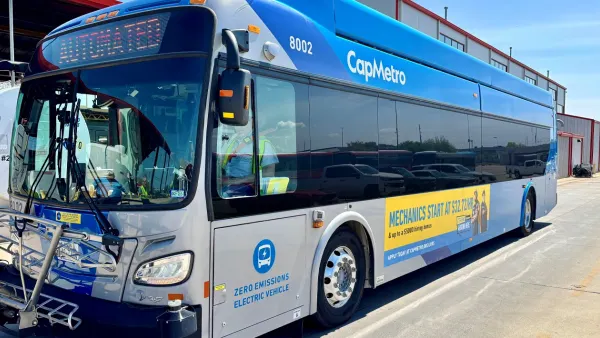UPDATE, Jan. 18, 2019: The city of San Francisco has officially committed to its new CityDrive program, a free, accelerated training program designed to increase the number of qualified, Class B-licensed drivers in the city. As of Wednesday morning, 125 former Chariot drivers — who were laid off earlier this month when the shuttle service shut down — had signed up for the program, according to the San Francisco Examiner. The city's Office of Economic Workforce Development hopes to still recruit the area's remaining 175 Chariot drivers to the program.
The program will not only help the drivers acquire their Class B licenses — the Examiner reports that only 15% of the 300 laid off Chariot workers had such licenses — but will also address operator shortages across the city's Municipal Transportation Agency (Muni).
Dive Brief:
- San Francisco Mayor London Breed is considering offering transit jobs to all 300 shuttle drivers laid off last week when private transit company Chariot folded, as first reported by the San Francisco Examiner and confirmed by Breed on Twitter.
- The move not only would provide jobs for hundreds of employees but also would address operator shortages at the city's transit agency, the San Francisco Municipal Transportation Agency (Muni).
- Breed reportedly is meeting with transportation and workforce development leaders to determine the logistics for bringing the former Chariot drivers on board. For example, the city must determine where overlap exists in driver training, and which training the new drivers would still need to go through to become licensed.
Dive Insight:
News of the city's interest in hiring the 300 workers came just days after Chariot announced it will cease operations by March. Although the potential solution came quickly, its implementation likely will take some time. In addition to leaders needing to find common ground on skills and identifying training needs, they will have to track down the Chariot employees, extend offers and go through a typical employment on-boarding process. Muni will need to perform due diligence with bringing new hires up to speed on policies and operating procedures, especially those related to safety.
Muni's ongoing shortage of bus and rail drivers is not a secret. However, just last month it came to light that the deficit is even worse than first reported and the number of applications Muni received has almost halved since 2014. Muni workers cite low pay and dangerous working conditions as reasons their peers leave the job.
Breed's interest in reaching out to Chariot employees highlights strategies that workforce experts say more cities should follow as the employment space changes. The move illustrates a willingness to seek partnerships for solving problems, encouraging non-classroom training and fostering a diverse job base instead of being a one-industry town. The action may inspire other cities to come up with creative ways to fill holes in their workforce with similarly-skilled employees who can be trained in a few areas.
Although this scenario appears to be leading toward a positive outcome for the laid-off Chariot employees, many in the mobility sector are keeping close eyes on the Chariot situation for additional fallout. Experts acknowledge the "white hot" pace of change with mobility and microtransit had been viewed as an area with considerable future promise within urban areas. It's too early to tell if other private microtransit businesses have long-term staying power, but a Chariot spokesperson said the business model is "not sustainable."











